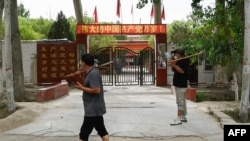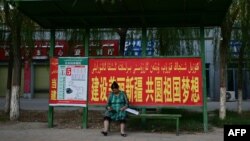Homes of people who went missing in China's crackdown on its Muslim minorities stand locked and silent in Xinjiang's rural heartland.
Others lie dilapidated or abandoned, and locals chase out AFP reporters seeking to find out the fates of the detained.
The Chinese government began rounding up Uyghurs in the northwestern region in large numbers from 2017 under what it calls an anti-terrorism policy.
More than 1 million people were allegedly detained, with reports surfacing of widespread abuses, including violence, rape and political indoctrination.
The United States branded the program a "genocide," and the United Nations said it may constitute crimes against humanity.
China has never disclosed the identities of most people it allegedly incarcerated and calls the facilities vocational schools.
Beijing says all their attendees "graduated" in 2019.
But human rights campaigners, scholars and Uyghurs overseas have detailed thousands of individual cases, many based on leaked government documents.
And many people remain unaccounted for.
In July, AFP travelled to four Uyghur-majority villages in the southern Xinjiang county of Yarkant in an effort to determine what had happened to some of those detained.
Police records obtained by the German scholar Adrian Zenz indicate up to half of adult men in the villages may have been rounded up at the height of the campaign.
One of them was Abduqahar Ebeydulla –- a husband, father and imam in his late 30s -- who vanished into police custody in 2016.
He is identified in Zenz's leaked records, and his case has previously been publicized by advocacy group Amnesty International and Uyghurs outside China.
In Abduqahar's home village of Bostan, the sound of livestock and piles of fresh-looking straw indicated that his family farmhouse was occupied.
But high metal doors to the single-story home were locked.
AFP did not knock on the door or approach neighbors for interviews to protect them from repercussions.
Further observations were disrupted when a group of Uyghur men -- some brandishing farm tools -- ordered reporters to leave.
They also blocked journalists from visiting the village government office to request more information.
'Religious' crimes
Abduqahar's case remains murky, but testimony given to AFP by a relative overseas sheds some light on his treatment.
The relative requested anonymity to protect their contacts in Xinjiang from repercussions.
They said Abduqahar was ordered by authorities to return to Yarkant in late 2016 for what seemed like routine questioning.
But he was spirited into the detention system and his associates outside China lost touch as the campaign gathered pace.
The relative said they later heard Abduqahar had been sentenced to 15 years in prison for "religious" crimes.
But they added that the Chinese government had never given them an explanation for the sentence.
Abduqahar "never did anything bad, certainly not anything illegal," the relative told AFP.
"He is very easygoing and respectful to others -– he has never harmed anyone."
So many men in Bostan were taken that Abduqahar's mother was buried in her backyard for lack of people to bear her coffin to the cemetery, the relative said.
Abduqahar's wife was also detained and his four children taken into state care, they said.
They have since been released and reunited, and his wife was recently permitted to visit her husband in prison some 1,000 kilometers away, according to the relative.
Neither Xinjiang authorities nor local governors responded to requests for comment about Abduqahar.
The Chinese foreign ministry said it was "unaware of relevant situations regarding individual cases."
AFP was ultimately unable to independently verify his location, sentence and condition, or the whereabouts and conditions of his wife and children.
Locked inside
AFP visited three other villages in Yarkant where alleged detention rates were extremely high, according to Zenz's files.
In every village, many homes were locked, and a few appeared neglected or abandoned.
At an address belonging to a three-generation family of seven -- three of whom were detained, according to the files -- the house stood silent and rundown.
And interference by people in the villages made it nearly impossible to confirm the status of detainees and verify more data.
AFP reporters were followed by up to five unmarked cars and obstructed -- but not harmed -- by up to a dozen Uyghur men, some lugging shovels and hoes.
Darting down narrow roads on electric scooters, the men were seen ordering villagers to return to their homes, sometimes locking them inside.
In Aral Mehelle, where around 80 people in a settlement of just a few hundred were allegedly detained, AFP identified the village committee chief among the disruptors.
Approached for comment, he jumped on a scooter and drove away at speed, and hung up when later contacted by phone.
China has consistently said it welcomes foreign journalists to report in Xinjiang.
The foreign ministry said it was "unaware of the specific issue" when asked by AFP about the interference.
'Make Xinjiang Chinese'
China's foreign ministry said most of those who left the vocational centers in 2019 had since "achieved stable employment."
They "have improved their quality of life, and now lead normal lives," according to the ministry.
But AFP reporters in Xinjiang saw some facilities identified by researchers as detention camps continuing to operate.
Several had staffed guard towers, security cameras and high walls topped with barbed wire.
Overseas scholars argue that authorities have also pivoted to other forms of repression.
They include handing some detainees long jail sentences and allegedly pushing them into a forced labor system that exports goods all over the world.
James Millward, a historian of Xinjiang at Georgetown University in the United States, told AFP that a concerted effort to forcibly assimilate ethnic minorities and "make Xinjiang Chinese" continues.
"There has been no let up in efforts to erase cultural autonomy of the Uyghur people," Millward said.
From his adopted home, Abduqahar's relative said they felt "guilt" about not getting him out of China when they had the chance.
"Everything changed very quickly, and I never expected it," they said.






